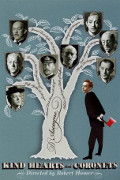
Directed by
Robert Hamer
104 minutes
Rated PG
Reviewed by
Bernard Hemingway

Kind Hearts And Coronets
Dennis Price is at his supercilious best as Louis Mazzini, whose mother, a member of the wealthy aristocratic D’Ascoyne family, was disinherited when she eloped with an Italian opera singer (also Dennis Price). She has brought up Louis alone in genteel poverty but when she dies and the family refuses to let her be buried in the D’Ascoyne mausoleum Louis decides to avenge his mother's death by murdering every D’Ascoyne (all played by Alec Guinness) who stands between himself, the family fortune and the title of Duke Of Chalfont.
Scripted by Hamer and John Dighton with uncredited contributions from Nancy Mitford and based on a novel by Roy Horniman Kind Hearts and Coronets is rightly regarded as one of the best of the post-war Ealing comedies and a classic example of British black humour. What makes it work so well is that we root for Louis who despite his wickedness is far more likeable and sympathetic a character than any of the pompous D’Ascoynes who treated his mother so abominably. Added to this is a merciless caricaturing of English upper class snobbery much of it thanks to Alec Guinness’s bravura embodiment of the eight living D’Ascoynes. Price’s priceless performance mirrors their to-the-manor-born conformity with cynical calculation. In this his soul-mate is his long-time mistress (Joan Greenwood) who, morality to be preserved, is also his downfall.
At times the film is a little rudimentary as in the demise of the Admiral who goes down with his cheap model ship and Guinness's drag turn as Agatha D'Ascoyne, a blue-stocking, deserved more exposure. The film’s ending is a little weak and one suspects given the cleverness of Horniman’s novel that it is better handled there.
FYI: The film’s title is taken from a poem by Tennyson quoted in the film ("Kind hearts are more than coronets/And simple faith than Norman blood"). Ealing returned to similar material with The Ladykillers (1955) whilst interested parties should also check out Frank Capra’s black comedy precursor, Arsenic and Old Lace (1944).
Want something different?





